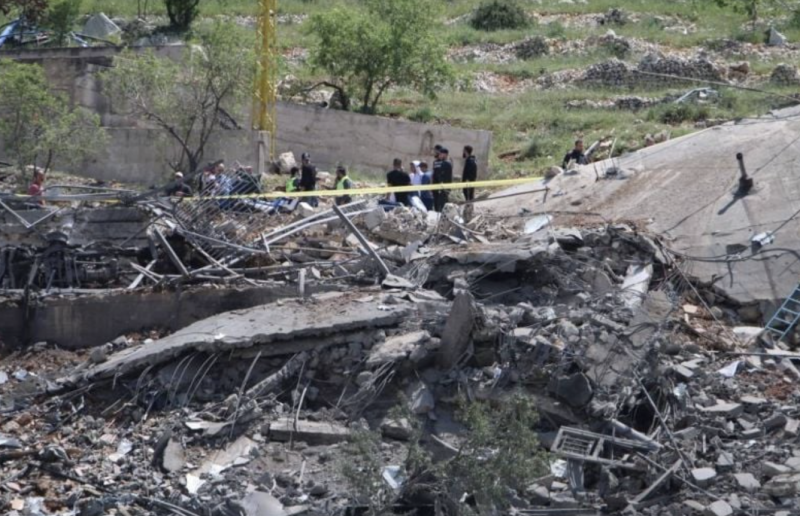
A building destroyed by an Israeli strike targeting the village of Nabi Sheet in Baalbeck, April 14, 2024. (Credit: AFP)
On Saturday night, Tehran conducted its first-ever attack against its Israeli enemy via hundreds of drones and missiles from its territory.
Iran had warned its neighbors of this imminent retaliation to Israel’s strike on its Damascus consulate. It did not ask for Hezbollah’s assistance.
All eyes are now on Israel to see if it will react, and what will be the nature, target and scale of any potential response.
Faced with Tehran’s and Washington’s declared desire to avoid a regional war at all costs, could Tel Aviv be tempted to take it out on Lebanon, by “punishing” Hezbollah instead of Iran?
The warring camps have so far expressed satisfaction in their statements after this unprecedented operation as if to say that everyone had somehow “won” this mutual deterrence game.
Israel is satisfied with its success in countering Iran’s operation by intercepting its large-scale projectiles, with the help of its US, British and French allies.
Israeli Prime Minister Benjamin Netanyahu wrote on X, “We intercepted, we repelled, together we will win.” It is “a success” that US President Joe Biden advised him to savor, just to dissuade him from planning an adventurous reaction.
Iran is proud to have taught Israel a lesson by displaying a “sample” of its military capabilities and salvaging its image in the eyes of its population and allies.
This does not mean that Israel will not seek to make Iran’s main ally in the region — if not Iran itself — pay the price, by extending the front already opened in south Lebanon. This would be an easy solution because Hezbollah is on the front line of the “unity of fronts” of the “axis of resistance” and is perceived as the main threat to Israel’s security.
However, many experts doubt it because Israel “has other fish to fry” and the US has been doing everything since the start of the war in Gaza to prevent its ally from extending the confrontations further into Lebanese territory.
“Israel has its own battle at home to wage. At the very most, it might be tempted to focus drastically on the southern front by stepping up its battle against Hezbollah,” said Riad Kahwaji, analyst and expert on military issues.
An outstandingly Iranian affair
Ever since it vowed to respond to Israel’s April 1 attack on its consulate in Damascus, the Islamic Republic has made it clear that it will not retaliate via its allies in the region. The Houthis participated slightly but Hezbollah did not, although the situation escalated simultaneously at Lebanon’s southern front.
Consequently, observers believe that if Israel is to attack Lebanon, this attack is unlikely to be in retaliation for Iran’s operation, at least not openly.
“As part of this equation, Hezbollah is not Iran’s agent or proxy,” said Kassem Kassir, an expert on Hezbollah affairs. In other words, this is an eminently Iranian affair, to spare Lebanon Israel’s wrath.
“Although the Israeli war cabinet has for months aspired to expand [the war at] the northern front [with Lebanon], if it decides to do so, it will not be in retaliation for the 300 projectiles Iran fired,” Kahwaji said.
Political Specialist Karim Bitar believes that there will probably be no open war in Lebanon, even if Israel might be “tempted to step up its strikes against Hezbollah.”
“According to the Iranians, the show is over. Israel would be stupid to prolong this episode by retaliating. If it decides to go ahead anyway, it will target Iran instead, to avoid arousing the wrath of Hezbollah even more,” said Nicholas Blanford, a researcher at the Atlantic Council.
However, there is a real fear that Netanyahu will continue his headlong rush, now that he has won back the sympathy and support of the West following the Iranian attack, especially as the players “are no longer rational,” said Bitar.
“If Netanyahu thinks it’s right to strike Lebanon, nothing will stop him,” Walid Joumblatt told L’Orient-Le Jour. “If he engages in an all-out war in Lebanon, it will be to divert attention from the holocaust taking place in Gaza and that will result in the elimination of the Palestinian population,” he added.
Hezbollah is cautious and believes that everything is possible. “It all depends on whether or not Israel would retaliate. The Iranian operation could stop at this stage. In that case, there will be no major escalation in Lebanon, and cross-border fighting will continue as before,” Hezbollah’s spokesperson Mohammad Afif Nabulsi told L’Orient-Le Jour.
On the other hand, he added, “In case Israel decided to retaliate, a chain of reactions and counter-reactions would be provoked and a dangerous escalation that will include Lebanon is to be expected.” The official did not point to a punitive action against Lebanon but a retaliation targeting a priori direct Iranian interests.
Mohanad Hage Ali, the deputy director for research at the Malcolm H. Kerr Carnegie Middle East Center in Beirut, indicated that Israel could indeed decide to retaliate against Iranian targets. “Escalation with Hezbollah could follow,” he said. Hage Ali perceived that Israel could get its revenge later, perhaps in Lebanon, but not in the foreseeable future.
This article was originally published in L'Orient-Le Jour. Translated by Joelle El Khoury.